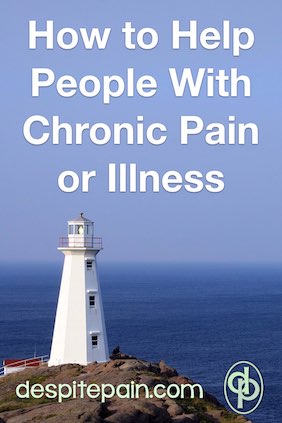This article was written by Liz the owner of the Despite Pain Blog . The article contains links to other content that you may find useful.
Liz suffers from scoliosis (a curvature of her spine) when she was about ten years old. Initially, the orthopaedic surgeon said it was a cosmetic problem and no surgery was needed. But it wasn’t just a cosmetic problem. It started causing chronic back and rib pain when she was a teenager. The scoliosis worsened and when she was eventually referred to see a specialist, he could do nothing to help. Her pain continued to worsen, became constant and eventually, when she was 28, she had to retire from work.
Her back pain was chronic and disabling, but she lived with another pain condition that is just as debilitating. Trigeminal neuralgia, which causes severe facial pain. For an unknown reason, the trigeminal nerves in her face send pain signals to her brain.
In 2017, she was also diagnosed with the autoimmune condition, coeliac disease.
She has lived with chronic pain for most of her life, but try’s to keep smiling.
Click here to find out more about Liz.
10 Suggestions on How to Help People with Chronic Pain or Chronic Illness
If you have a friend or relative who lives with chronic pain or a chronic illness, the following suggestions are ways in which you could possibly provide physical help and support.
1. Believe Them
Believing them is the most important and supportive way to help people with chronic pain or illness.
Believe them when they tell you about their pain or illness. Believe them if they tell you that their life is difficult and that they’re struggling to cope. Believe them when they say their pain is off the charts. Believe them when they say they feel depressed. Please, never doubt them.
They need your empathy and understanding and that starts by letting them know that you believe them.
2. Listen to Them
Listen to them. Really listen.
If you ask them how they are feeling, please listen to the answer. There’s no point in asking otherwise.
Tell them that you are there if they want to vent. Many people feel they can’t or shouldn’t do that so tell them that you don’t mind listening.
They might say they’re fine when you know they’re not. So say, “I know you say you’re fine, but it’s okay to be honest with me.” If they still say they’re fine, don’t push it. Some people simply don’t like talking about their health or they might not be in the mood for opening up.
Never repeat what they tell you – if they feel comfortable enough to talk to you, don’t betray them by repeating what they say to others. You’ve gained their trust so don’t lose it.
3. Learn About Their Condition
Try to learn about their condition and how it affects them so that you understand more. I’m not suggesting you need to learn enough to obtain a medical degree, but if you learn a little bit, it will let them see that you are actually interested rather than being there out of a sense of duty.
4. Empathise
Empathise with them, but don’t tell them you know exactly how they feel. You might get an occasional bad headache, but that’s not the same as living with trigeminal neuralgia or chronic debilitating migraines. Even if you suffer from the same condition, everyone’s experience is different so, in reality, you don’t really know exactly how they feel. Empathise and tell them that you appreciate that their life can’t be easy.
5. Be There
Living with chronic pain or chronic illness can be a lonely life. Sometimes people just need a friend so give them your time.
They don’t need or want to talk about their pain or illness all the time. They don’t want pity or sympathy. Nor do they want to be treated with kid gloves and they do not expect you to be a nursemaid. They want to feel normal, do normal things and have normal chit-chat with you.
They need distractions from their health. You could share a meal with them, help them with a hobby or just sit with them to play a board game or enjoy a movie together. You could take them for a drive, go for a walk or take them shopping if they’re able. If you do this, please go at their pace so they don’t feel as though they’re holding you back, otherwise they will feel guilty. Talk about other things, including yourself. Talk about your own troubles if you have any because they still care about what’s going on in your life.
6. Help with Appointments
Offer to take them to their medical appointments. They might need your help getting there or they might be grateful for some moral support or an extra pair of ears during the appointment.
7. Offer Practical Help
Living with chronic pain or illness is debilitating, therefore simple tasks are often more like huge, possibly impossible, chores. They might be grateful for your help with some basic housework, making a meal or doing some shopping. Or perhaps you could help by picking their kids up from school or walking their dog occasionally.
But be tactful about how you offer your help as it may be construed as criticism.
For example, don’t tell them that their house needs to be cleaned. Instead, tell them that you realise that some chores must be extremely difficult due to their pain or illness, and you’d be happy to help out with something they find too difficult.
Try to offer help in a way that it’s easier for them to accept. For example, say, “I will be at the supermarket tomorrow, so it will be easy to pick up some shopping for you while I’m there.” That way, they know that you are already going to the supermarket, so you aren’t going out of your way just for them.
Offer help but try to understand if your kind offer is turned down. They might feel embarrassed, or they may still want independence so if they repeatedly say they don’t need or want your help, accept that and back off. Rather than be upset or take offence, simply tell them that you’re there if they ever need you.
8. Be Inclusive
When people are living with pain or illness, they might not be well enough to attend social events but please invite them anyway. They might not be well enough to come to your birthday party or to meet for coffee, but they also don’t like to feel excluded, so invite them and let them decide.
If they say yes, they might have to cancel or leave early due to their illness getting in the way. If that happens, don’t take it personally. Try to understand that it’s out of their control and accept that their health can be unpredictable. They are probably embarrassed and annoyed with themselves, so a little understanding will go a long way.
9. Don’t…
There are a lot of things you shouldn’t do or say. Here are a few:
-
- Please don’t abandon them. Their pain or illness might get in the way, but they still value and want the relationship they have with you.
- Never suggest that they shouldn’t take their medication or that they take too much. If you have a serious concern that it could be making them ill, suggest they speak to their doctor.
- Don’t insinuate that they can’t be trying hard enough by telling them that your amazing friend has the same condition but is able to do so much more than them.
- Don’t minimise their pain or illness by saying things like, “Well, it could be worse…” or “At least it’s not cancer.”
- Don’t be dismissive of their symptoms or feelings and don’t tell them how
- they should feel. Their pain or illness is real. Their feelings are real and valid.
- Never suggest that they just need to give themselves a shake, pray a bit harder, go for a brisk walk or be more positive in order to feel better. Statements like that undermine them and their condition. They are also patronising and extremely rude.
- Avoid suggesting strange herbal concoctions which are advertised online. Most of those strange herbal concoctions are expensive snake oil cures.
- And please don’t suggest that they drink a kale and turmeric smoothie to cure their ills. If you do, you might get said smoothie tipped over your head.
10.Bring Chocolate
Unlike kale and turmeric smoothies, chocolate is nearly always welcome. So, bring on the chocolate. Or cake. That works too.






